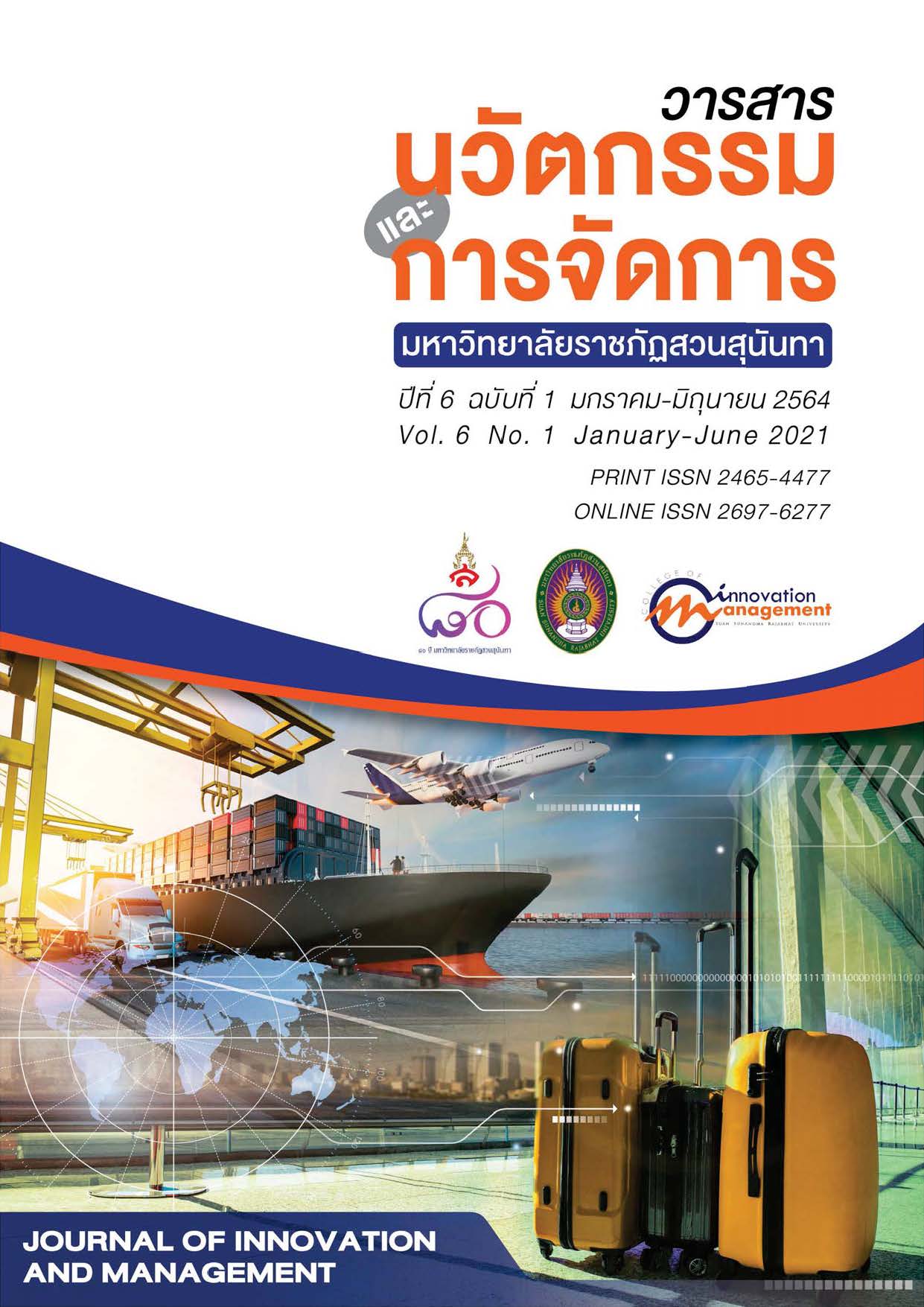Competencies of Aspiring Accountants in the Digital Age According to International Education Standards for Accounting Professionals
Keywords:
Competency, Aspiring accountants, Digital ageAbstract
The objectives of this research were (1) to study the competency level of preferred accountant accountants in the digital age in accordance with international educational standards for professional accountants, and (2) to study the correlation of competencies of aspiring accountants in the digital age. Digital and international education standards for professional accountants by studying a sample of 333 industrial accountants in Nonthaburi Province. By simple sampling method by drawing the lottery according to the specified proportion. The research instruments were closed-ended and open-ended questionnaires. The questionnaire was measured for IOC with a mean of not less than 0.60 and the reliability value was 0.957. The majority of respondents were female, 82.60%, age 21-30 years, 58.90%, working age less than 5 years, 60.10%. At the bachelor's degree level, 68.80% and most of the monthly income is not more than 15,000 baht 44.10%. By studying the opinions of the desired accountant competencies in the digital age as a whole, it was found that 4 areas were professional ethics ( = 4.48, S.D. = 0.52) at the highest level, followed by performance ( = 4.23, S.D. = 0.53) and expertise in different skills ( = 4.13, S.D. = 0.53) Knowledge and professional intelligence ( = 3.89, S.D. = 0.84) were the last. For the study of the relationship of the desired performance of accountants in the digital age. It consists of knowledge and professional wisdom (Knowledge), the competency of the desired accountant in the digital age, professional ethics (Ethics), the desired accountant's performance in the digital age, working (Working) and the competency of the accountant who In the digital age, expertise in various skills (Expertise) found that there was a significant relationship with the overall international education standard at a significant level of 0.01
References
AMTaudit. (2015). Qualifications of a professional accountant. [Online]. Retrieved on March 28, 2018 from: https://www.amtaudit.com/view_news.php?id=24. (in Thai)
Best, W. J. (1997). Research in Education. Englewood Cliffs, New Jersey: Prentice – Hall.
Booncharoen, S., Sirimethee, P., and Chetkhunthot, P. (2016). Professional Competency Model of Accountants to Support ASEAN Trade Liberalization in Nakhon Ratchasima. Rompruek Journal, Krirk University, 34 (3), 117-136 . (in Thai)
Cheepaphatthanaphan, T. (2014). Competency of accountants in industrial factories. In the Nonthaburi province, according to the viewpoint of the accounting supervisor. Nonthaburi: Rajapruek University. (in Thai)
Damasiotisa, V., Trivellasb, P., Santouridisa, I., Nikolopoulosa, S. and Tsifora, E. (2014). IT Competences for Professional Accountants: A Review. The Proceedings of International Conference on Strategic Innovative Marketing, IC-SIM 2014, September 1-4, 2014, Madrid, Spain, 537-545.
Department of Business Development Ministry of Commerce. (2016). Importance of accountants to business in the digital economy and society era. [Online]. Retrieved 27 March 2018 from: http://www.53ac.com. (in Thai)
Ku Bahador, K.M. and Haider, A. (2012). Information Technology Skills and Competencies–A Case for Professional Accountants. Lecture Notes in Business Information Processing, 127, 81-87. DOI:10.1007/978-3-642-34228-8_9
Kuasakul, M. and Watodomprasert, V. (2015). Qualifications of an accountant in an organization in accordance with the International Educational Standards for Professional Accountants in Accounting Professionals and Accountants. In establishments need a case study: Establishment in Samut Sakhon Industrial Estate. Academic Journal, Thonburi University, 9(20), 49-58. (in Thai)
Likert, R. (1932). A Technique for the Measurement of Attitudes. Archives of Psychology, 140, 1–55.
McClelland, D.C. (1973). Testing for Competence rather than Intelligence. American Psychologist, 28(1), 1–14.
Mitrani, A., Dalziel, M., and Fitt, D. (1992). Competency based human resource management: Value driven strategies for recruitment, development, and reward. London: McGraw-Hill.
Monique, K., Denise, J. (2018). Pervasive skills development for aspirant chartered accountants: Academic versus training programmes. Journal of Economic and Financial Sciences, 11(1), 340-348.
Office of Civil Service Commission. (2019). Digital literacy and understanding skills. [Online]. Retrieved 5 January 2020 from: https://www.ocsc.go.th/DLProject/mean-dlp. (in Thai)
Office of the Board of Investment (2014). BOI Investment Promotion Area. [Online]. Retrieved 10 April 2018 from: http://www.apsconsult.com/index.php/en/features-2/custom/boi. (in Thai)
Özçelik, G. and Ferman, M. (2006). Competency Approach to Human Resources Management: Outcomes and Contributions in Turkish Cultural Context. Human Resource Development Review, 5(1), 72-91.
Padthong, C., Panjan, W., Na Wichian, S., Saengsook, N., and Rodjam, C. (2020). Development Model of Human Resources Management for The Small and Medium Enterprises (SME). Journal of Innovation and Management, 5, 59-71.
Phatichon, P. (2019). Challenges in the 21st Century: Digital Knowledge… Is It Required?. [Online]. Retrieved 6 January 2020 from: http://www.ksr.co.th. (in Thai)
Rittichai, A. (2008). Concept of competency. (Competency). [Online]. Retrieved 3 April 2018 from: https://www.jobpub.com/articles/showarticle.asp?id=2213. (in Thai)
Sincharu, T. (2009). Research and analysis of statistical data with SPSS. 10th ed. Bangkok: Ordinary Partnership. Business R&D. (in Thai)
Spencer, L.M. and Spencer, S.M. (1993). Competence at work: Model for superior performance. New York: Wiley.
Thai Accounting Center. (2013). Qualifications of a professional accountant according to IES requirements. [Online]. Retrieved 4 April 2018 from: http://tac.prosmes.com/Article/Detail /21682...87-IES. (in Thai)
Thanurattanaphong, U. (2012). ASEAN Economic Community Service in Accounting Professions (1). [Online]. Retrieved 27 March 2018 from: http://tax.bugnoms.com/the-effect-of-aec-with-accounting. (in Thai)
Tirakanan, S. (2013). Research Methods in Social Science: A Guide to Practice. 11th ed. Bangkok: Chulalongkorn University Press. (in Thai)
Uttayarath, S. (2014). How should an accountant prepare? When accessing AEC. [Online]. Retrieved 27 March 2018 from: https://th.jobsdb.com/th-th/articles-aec. (in Thai)
Yamane, T. (1967). Taro Statistic: An Introductory Analysis. New York: Harper & row.
Downloads
Published
How to Cite
Issue
Section
License
Copyright (c) 2021 Journal of Innovation and Management

This work is licensed under a Creative Commons Attribution-NonCommercial-NoDerivatives 4.0 International License.
See Publication Ethics https://so03.tci-thaijo.org/index.php/journalcim/Ethics






